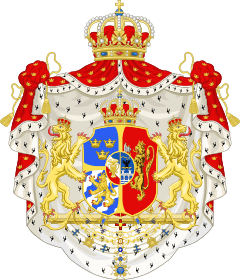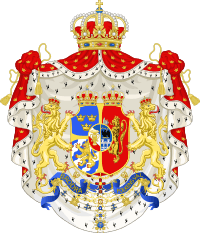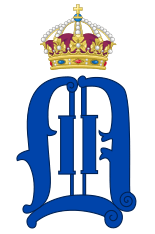Oscar II of Sweden
| Oscar II | |||||
|---|---|---|---|---|---|
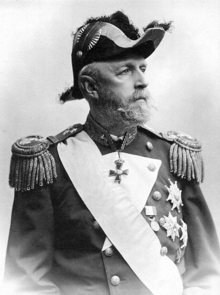 | |||||
| King of Sweden | |||||
| Reign | 18 September 1872 – 8 December 1907 | ||||
| Coronation | 12 May 1873 | ||||
| Predecessor | Charles XV | ||||
| Successor | Gustaf V | ||||
| King of Norway | |||||
| Reign | 18 September 1872 – 7 June 1905 | ||||
| Coronation | 18 July 1873 | ||||
| Predecessor | Charles IV | ||||
| Successor | Haakon VII | ||||
| Born |
21 January 1829 Stockholm Palace, Stockholm | ||||
| Died |
8 December 1907 (aged 78) Stockholm Palace, Stockholm | ||||
| Burial | Riddarholmskyrkan, Stockholm | ||||
| Spouse | Sofia of Nassau | ||||
| Issue |
Gustaf V of Sweden Prince Oscar Bernadotte Prince Carl, Duke of Västergötland Prince Eugén, Duke of Närke | ||||
| |||||
| House | Bernadotte | ||||
| Father | Oscar I | ||||
| Mother | Josephine of Leuchtenberg | ||||
| Religion | Church of Sweden | ||||
| Signature |
| ||||
Oscar II (21 January 1829 – 8 December 1907), baptised Oscar Fredrik,[1] was King of Sweden from 1872 until his death and King of Norway from 1872 until 1905. The third son of King Oscar I of Sweden and Josephine of Leuchtenberg, he was a descendant of Gustav I of Sweden through his mother.
Early life
At his birth in Stockholm, Oscar Fredrik was created Duke of Östergötland. He entered the navy at the age of eleven, and was appointed junior lieutenant in July 1845. Later he studied at Uppsala University, where he distinguished himself in mathematics. On 13 December 1848, he was made an honorary member of the Royal Swedish Academy of Sciences.
On 6 June 1857 he married in Wiesbaden-Biebrich, Germany, Princess Sophia Wilhelmina, youngest daughter of Duke William of Nassau.
From 1859, when his father died, he was first in line to the Swedish throne after his oldest brother King Charles, who then had no male heirs (his son had died in infancy in 1854). His middle brother Gustaf had died in 1852.
King of Sweden and Norway
He succeeded his brother Charles XV / IV on 18 September 1872. At the accession he adopted as his motto Brödrafolkens väl / Broderfolkenes Vel ("The Welfare of the Brother Peoples"). While the King and the Royal Court resided mostly in Sweden, Oscar made the effort of learning to be fluent in Norwegian and from the very beginning he realized the essential difficulties in the maintenance of the union between the two countries.
Death
The political events which led up to the peaceful dissolution of the union between Norway and Sweden in 1905 could hardly have been attained but for the tact and patience of the king himself. He was dethroned on 7 June 1905 by the Norwegian Parliament and renounced the Norwegian throne on 26 October. He declined, indeed, to permit any prince of his house to become king of Norway, but better relations between the two countries were restored before his death. He died in Stockholm on 8 December 1907 at died at 9:10 AM.[2]
Foreign and domestic statecraft
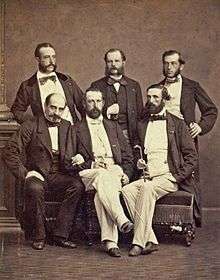
His acute intelligence and his aloofness from the dynastic considerations affecting most European sovereigns (both of his grandfathers were French military commanders who served under Napoleon) gave the king considerable weight as an arbitrator in international questions. At the request of Great Britain, Germany and the United States in 1889 he appointed the chief justice of Samoa, and he was again called on to arbitrate in Samoan affairs in 1899.
In 1897 he was empowered to appoint a fifth arbitrator if necessary in the Venezuelan dispute, and he was called on to act as umpire in the Anglo-American arbitration treaty that was quashed by the United States Senate. He won many friends in the United Kingdom by his outspoken and generous support of Britain at the time of the Second Boer War (1899–1902), expressed in a declaration printed in The Times of 2 May 1900, when continental opinion was almost universally hostile.[3]
He was the 1,027th Knight of the Order of the Golden Fleece in Spain and the 774th Knight of the Order of the Garter in 1881.
The office of prime minister was instituted in 1876. Louis De Geer became the first head of government in Sweden to use this title. The most known and powerful first minister of the Crown during the reign of Oscar was the conservative estate owner Erik Gustaf Boström. Boström served as Prime Minister in 1891-1900 and 1902-1905. He was trusted and respected by the king, who had much difficulty approving someone else as prime minister. Over a period of time, the king gave Boström a free hand to select his own ministers without much royal involvement. It was an arrangement (unintentionally by both the King and Boström) that furthered the road to parliamentarism.
Science and arts
 King Oscar II in full regalia – he was the last crowned Swedish king and was known to enjoy the pomp and ceremony. |
 Portrait of Oscar II by Anders Zorn 1898 |
Himself a distinguished writer and musical amateur, King Oscar proved a generous friend of learning, and did much to encourage the development of education throughout his dominions. In 1858 a collection of his lyrical and narrative poems, Memorials of the Swedish Fleet, published anonymously, obtained the second prize of the Swedish Academy. His "Contributions to the Military History of Sweden in the Years 1711, 1712, 1713," originally appeared in the Annals of the Academy, and were printed separately in 1865. His works, which included his speeches, translations of Herder's Cid and Goethe's Torquato Tasso, and a play, Castle Cronberg, were collected in two volumes in 1875–76, and a larger edition, in three volumes, appeared in 1885–88.
His Easter hymn and some other of his poems are familiar throughout the Scandinavian countries. His Memoirs of Charles XII of Sweden were translated into English in 1879. In 1881 he founded the World's first open-air museum at his summer residence near Christiania, now Oslo. In 1885 he published his Address to the Academy of Music, and a translation of one of his essays on music appeared in Literature in May 1900. He had a valuable collection of printed and manuscript music, which was readily accessible to the historical student of music.
Being a theater lover, he commissioned a new opera house to be built by Axel Anderberg for the Royal Swedish Opera which was inaugurated on 19 September 1898. It is until today the current home of that institution. Oscar II told Henrik Ibsen that his Ghosts was "not a good play". As he was dying, he requested that the theatres not be closed on account of his death. His wishes were respected.
King Oscar II was an enthusiast of Arctic exploration. Along with Swedish millionaire Oscar Dickson and Russian magnate Aleksandr Mikhaylovich Sibiryakov, he was the patron of a number of pioneering Arctic expeditions in the 1800s. Among the ventures the king sponsored, the most important are Adolf Erik Nordenskiöld's explorations to the Russian Arctic and Greenland, as well as Fridtjof Nansen's Polar journey on the Fram.[4]
The name and portrait of Oscar II have been used as a trademark for King Oscar sardines (which remains the only brand to obtain his "royal permission") as well as for gingerbread cookies (pepparkakor) and other bakery products made by Göteborgs Kex AB.
King Oscar was also a generous sponsor of the sciences, particularly mathematics. He set up a contest, on the occasion of his 60th birthday, for any scientist who was able to answer the question of the 3-body problem, specifically applied to the stability of the Solar System.[5][6]
Children
 Oscar II boating. Engraving by Anders Zorn. |
King Oscar II was married to Sophia of Nassau. Their children were:
- 1. King Gustaf V (1858–1950)
- 2. Prince Oscar, Duke of Gotland, later Count Oscar Bernadotte af Wisborg (1859–1953)
- 3. Prince Carl, Duke of Västergötland (1861–1951)
- 4. Prince Eugén, Duke of Närke (1865–1947)
Oscar also is alleged to have had several extramarital children, among them:
Oscar II (unlike his father) never officially recognized any illegitimate children of his. He is also alleged to have had two sons with the actress Marie Friberg,[9] Nils and August Ekstam (the latter born 1878).[10]
His eldest son, Oscar Gustaf Adolf, duke of Värmland, succeeded him as King Gustaf V of Sweden. His second son, Oscar, resigned his royal rights on his marriage in 1888 with a lady-in-waiting, Miss Ebba Munck, when he assumed the title of Prince Bernadotte and from 1892 he was known as Count Wisborg. The king's other sons were Charles, duke of Västergötland, who married Princess Ingeborg of Denmark; and Eugén, duke of Närke, well known as an artist.
As King of Norway, he was, after the events of 1905, succeeded by his grandnephew Prince Carl of Denmark, grandson of his late elder brother King Charles, who ascended the Norwegian throne in 1905 with reign name Haakon VII. Almost a century later, in 1991, a great-grandson of Oscar II, namely Harald V of Norway (grandson of Oscar's third son, the duke of Västergötland), would succeed to the throne of Norway once held by Oscar II.
Ancestry
Heraldry
| Heraldry of Oscar II of Sweden | |||||
|---|---|---|---|---|---|
|
References
| Wikimedia Commons has media related to Oscar II of Sweden. |
- ↑ Stockholm City Archives, archive of the Court parish, birth and baptism records, volume C I:5
- ↑ "Death Of Oscar King Of Sweden. His Son Ascends The Throne And Takes The Title Gustave The Fifth". New York Times. December 9, 1907.
He Eulogizes His Father Tells Why The Country Should Cherish His Memory. In His Sentiments All Sweden Shares.
- ↑ Chisholm 1911.
- ↑ Aho, Maire (January 1999), "AE Nordenskiöld Collection included in the Unesco Memory of the World Program", Tietolinja News, FI: Helsinki.
- ↑ King Oscar’s Prize. Springer.
- ↑ The solution of the n-body problem, Florin Diacu. Mar 2016.
- ↑ Anna Hofmann – varietéstjärna och filmregissör, catalogue of exhibition by that name at Stockholms Stadsmuséum 1998 with essays by Åke Abrahamsson and Marika Lagercrantz/Lotte Wellton.
- ↑ Norlin, Arne (2015). Familjen Bernadotte: makten, myterna, människorna (in Swedish). Stockholm: Fischer & Co. pp. 218–220. ISBN 9789186597962. LIBRIS 17803399.
- ↑ Sherlock Holmes and the King of Scandinavia The Swedish Pathological Society
- ↑ Sandberg, Mattias (24 May 2010). "Jakten på den försvunne sonen". Aftonbladet (in Swedish). Retrieved 4 May 2016.
 This article incorporates text from a publication now in the public domain: Chisholm, Hugh, ed. (1911). "Oscar II.". Encyclopædia Britannica. 20 (11th ed.). Cambridge University Press. p. 346.
This article incorporates text from a publication now in the public domain: Chisholm, Hugh, ed. (1911). "Oscar II.". Encyclopædia Britannica. 20 (11th ed.). Cambridge University Press. p. 346.
Further reading
- Cronholm, Neander N. (1902). A History of Sweden from the Earliest Times to the Present Day. pp. 301–10.
 "Oscar II.". The American Cyclopædia. 1879.
"Oscar II.". The American Cyclopædia. 1879.
 "Oscar II, Frederic". The New Student's Reference Work. 1914.
"Oscar II, Frederic". The New Student's Reference Work. 1914.
External links
| Oscar II Born: 21 January 1829 Died: 8 December 1907 | ||
| Regnal titles | ||
|---|---|---|
| Preceded by Charles XV/IV |
King of Sweden 18 September 1872 – 8 December 1907 |
Succeeded by Gustav V |
| King of Norway 18 September 1872 – 7 June 1905 |
Vacant Title next held by Haakon VII | |
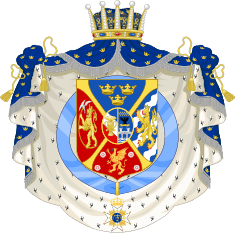
_de_Suede_a_partir_de_1844.svg.png)
